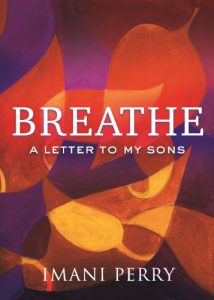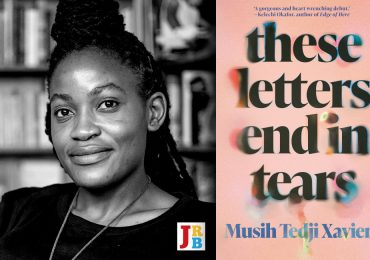Imani Perry’s Breathe is a memoir committed to the radical hope that sees Black boys as more than problems to be solved, writes Rofhiwa Maneta.

Breathe: A Letter to My Sons
Imani Perry
Beacon Press, 2019
In a piece for the American book review Public Books, interdisciplinary scholar and professor Imani Perry dubbed 2015 ‘the year of Black memoir’. Citing the (then-recently published) works of Ta-Nehisi Coates, Margo Jefferson and Clifford Thompson, Perry described the strengths of memoir as a literary genre and its limitations as an archival practice as follows:
Memoir, the offspring of the slave narrative, is not simply a form within the Black literary tradition; it has thoroughly shaped that tradition … However, in the current landscape, when Black life is so varied and complex, no memoir can stand as a singular representation of Black life, regardless of how compelling it might be. They stand in a tradition but the world is not the same.
The memoir, argued Perry, is the act of its author making sense of their particular story and the set of circumstances that shaped it. That an author’s life is used as raw material to pursue this end complicates the process even further. No two writers—despite, say, racial similarities—share similar identities. Class, gender, disability and other forms of identity intersect differently in our experiences of racism and how we experience the world at large.
So, while the memoir may have an established history in Black literary tradition, no two works should be expected to share a sensibility. Where Coates’s Between The World and Me sees no hope on the horizon, Kiese Laymon’s Heavy preaches radical love, revision and reckoning as mechanisms for healing from the terror that racism has wrought on Black life.
With this in mind, it has been disappointing to see how emphatically Perry’s memoir, Breathe, has been compared to Coates’s Between The World And Me.
In some respects, it is easy to see what drives the impulse to compare. Both works are Baldwinian epistolaries addressed to the writers’ children on the schemes America has invented to rip the air from their lungs. Richard Wright’s 1940 classic, Native Son, inspired both authors. Both books are divided into three sections and borrow Wright’s naming convention (Fear, Flight and Fate—although Perry’s sections are Fear, Fly and Fortune). Both are rendered in rich, lyrical prose that is reminiscent of James Baldwin’s The Fire Next Time.
But these structural elements mark where the similarities end. While Between The World And Me never rises above the racial terror catalogued to its addressee—Coates sees white supremacy as central and unerasable from America’s national personality—Breathe does something else entirely. It dares the world to see Black children as fully human, deserving of love, tenderness and access to healthy choices.
Breathe starts with a quote Perry attributes to ‘everybody and their mother’: ‘It must be terrifying to raise a Black boy in America.’ The statement assumes that the lives of Black boys can be projected on a straight line and that, at some point, a force greater than themselves propels them to run to meet the world’s (dire) intentions. They are a problem that needs solving. A few lines later, however, Perry responds to this notion: ‘No matter how many say so, my sons, you are not a problem … Mothering you is not a problem. It is a gift. A vast one.’
In an interview on the podcast On Being, Perry spoke of how her book was an attempt to answer the question first asked by WEB Du Bois in The Souls of Black Folk in 1903: ‘How does it feel to be a problem?’
And part of what I’m trying to work through is that, yes, there is terror but there is also incredible beauty [in mothering]. And there’s a way in which repetition of the narrative of terror almost evacuates the full humanity of their lives, and my life, and also the incredible beauty.
Although in it Perry describes herself as a ‘sucker for descriptive beauty and melodrama’, Breathe never borders on the melodramatic or overly sentimental. She describes her sons as smelling of honey and powder, with ‘eyes that glisten and smiles that are sweet’. There are other similarly captivating turns of phrase: her children have ‘sinewy strength’ and ‘eyes that tend towards vigilance’. But because to plunder is part of America’s DNA, the passages of beauty are always followed by the fear that some or other physical injury will visit her sons. Nowhere is this prism more visible than in the following lines:
You are clever and kind boys. And beautiful—I mean you are truly beautiful, but you are also beautiful in the way people like to look at beautiful. And your language is so crisp—listen to those Black boys who know all of those vocabulary words! And still they pick: OK smart but … aggressive, distracted, distracting. Too mobile, too slow, too fast, too inattentive. […] You are just too black.
Indeed, some sort of racialised terror always lies waiting on the horizon, with its promise of either humiliation or death. There are passages in the book that deal with real and imagined threats, and each time Perry catalogues these, she is at pains to remind her sons that she cannot guarantee their safety. She shares one particular memory of their house alarm going off and the police making the resulting visit. What if the police mistook her children for intruders? ‘People may say I’m being melodramatic. They have,’ Perry writes. ‘But police kill middle-class Black children and adults too.’
These words sound particularly loud today. But even before George Floyd (and Breonna Taylor, and Tony McDade, and Sean Reed, and Rayshard Brooks) there has been an endless amount of media real estate dedicated to the deaths or bodily injury of Black teenagers, Black children, whose crime was wearing a hoodie, asking for directions or playing music too loudly. They were just as loud in 2019, when Breathe was published, to many,
In his final moments, George Floyd lay immobile, hands cuffed, with a knee obstructing his ability to breathe. With the life ebbing away from him, he called out: ‘Momma! Momma! My knee. My neck. I’m through.’ The moment of Floyd invoking his deceased mother as a last-ditch attempt to preserve his life is particularly compelling when read with the context of Perry’s book in mind. George Floyd’s mother could not protect her son. Neither could Emmett Till’s mother or Eric Garner’s or Trayvon Martin’s. Similarly, history forbids Perry from doing the same. In a recent article for The Atlantic, she wrote:
We know the wail of a dying man calling for his mama, and it echoes into the distant past and cuts into our deepest wounds.
But as she also notes in the above-mentioned essay, and throughout her book, blackness is not the problem, racism is. Black life is about more than survival. It’s a compendium of wonderful, defiant joy and majesty.
For a book of its length (186 pages), it never feels like Breathe sprints to cover the long distance it travels. While Perry exhorts her sons to find their way in a world not built to accommodate them, she also cautions against giving into the prison of conventional masculinity. This never devolves to finger-wagging sermonising or moral grandstanding. If anything, she uses these passages to revise her own attachments to gender conventions.
When he was in the third grade, Freeman (her elder son) pointed out the sexism in an assigned literary text:
The teacher, perhaps thinking you didn’t know what you meant, asked why you thought it was sexist. You explained that the woman was being valued for her beauty and nothing else. The man was fixated upon her, but didn’t bother to know her.
In another section, Perry’s younger son Issa called calls her refusal to let him pierce his ears ‘inconsistent with her feminist identity’. When Perry says her refusal is based on cultural conventions, her son calls bullshit:
‘If I was a girl, you know you would let me get my ears pierced. You say it is cultural, but it’s just gender rules.’ True. ‘Culture,’ I have said, but of course nearly everything terrible is part of culture as much as that which is good. Culture isn’t a word that ought to work as a defense. Be better than me with respect to that.
These may sound like pedestrian moments—especially considering that they aren’t rendered in the breathtaking prose that fills most of the book—but this reckoning on the author’s part confers authenticity to her text. As a whole, memoir is a genre dedicated to truth rather than fact. It is also, essentially, a reproduction of memory. And because memory is always in service of the narrator, the results can and often do border on self-hagiography. That Perry is willing to turn the lens back to herself—while never resorting to the kind of ‘self-abasement-as-virtue’ shtick prevalent in popular discourse and social media—is refreshing. She encourages her sons to run away from lies: America’s, society’s and, sometimes, her own.
Toward the end of the book, Perry encourages her sons to take flight:
I want you to follow the stars, where they take you, to go the way your blood beats, and once you are there, I want you to build a glorious edifice at the pitch of freedom so whole that you forget the skeleton and scaffold were ever necessary.
In a book full of lyrical instruction, something about this passage feels particularly compelling. It’s a passage that brings to mind an essay by Filipinx American writer Lisa Factora-Borchers in a 2016 anthology titled Revolutionary Mothering: Love on The Front Lines. Titled ‘Birthing a New Feminism’, the essay details the birth of the author’s son and how a new kind of feminist thinking was born with him (for the writer, at least). She writes:
To me, motherhood is a state of helpless yearning. The world shows itself in full color the first night you become a parent. You begin to yearn for the impossible: guarantees of safety and justice. And recognising that impossibility often made me tearful. But I didn’t want to spend my life crying over impossibilities. I suddenly had this crazy urge to clean up the world for my son. I needed to organise.
Imani Perry’s epistle is defined by this yearning for the impossible. But where its contemporary, Between The World And Me, despairs, Breathe is committed to radical hope. A hope that sees Black boys as more than problems to be solved, encouraging them to pursue and guard their humanity with a single-minded determination.
- Rofhiwa Maneta is a Johannesburg-based writer and journalist.





